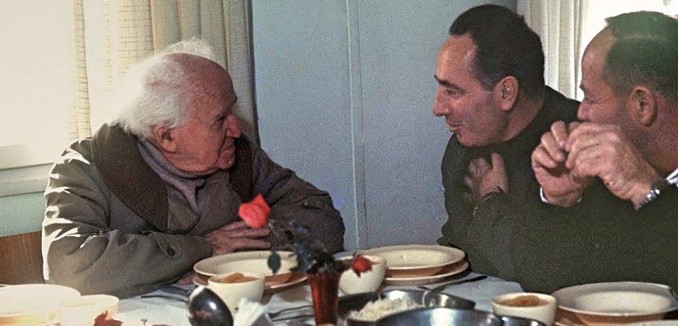Shimon Peres symbolized possibility. He embodied the daring idea that the impossible could be made possible. It wasn’t blind faith that led him on this path. It was experience. In his life he witnessed time and again how ideas and dreams, previously deemed insane, became taken-for-granted reality. Primarily among these was Zionism and the State of Israel. In the painful history of his family and in his early life, he experienced how the trodden-upon Jewish people found within themselves the audacity to dream big and act even bigger.
With his own two hands he helped midwife a present for a Jewish people that was once a ridiculous future. He helped David Ben-Gurion win numerous political battles on the road to leading the Jewish people to freedom in their land. He made sure that the Jews fighting a war of annihilation, which the Arab countries waged against the nascent Jewish state, had the weapons they needed to ultimately prevail. He forged global alliances that made Israel more secure and had the gall to obtain for the beleaguered young state the ultimate weapon to secure its survival in a hostile region. But when decades later he recognized that the region might be turning somewhat less hostile, he grabbed the opportunity and brokered careful understandings between former sworn enemies.
Time and again he was ridiculed for his dreams. He couldn’t care less. He was immune to ridicule. He knew that Theodor Herzl, who dreamt of a sovereign republic for the Jewish people, was ridiculed for his supposed delusions to his last day. Yet when everyone was wrong, Herzl was right. Shimon Peres was willing to bear ridicule, because he knew the future would prove him right. And even if not, he at least tried—and had fun doing so. Up to his last day, he retained a child’s sense of wonder and fun. He enjoyed weaving grand visions and then going about realizing them. He enjoyed waking up every day (at 4:00 AM!) to a new day of action in the service of dreams.
His dreams were not confined to security, defense, and peace. He loved arts, culture, and science. When I started working for him, his passion of the moment was nanotechnology. It was the manifestation at that time of his perennial infatuation with the future and all that is new and promising and full of possibility. He approached nanotechnology the way he approached all his grand ideas: with curiosity, relentlessness, and a plan for action. He did not let a single person who came to see him, whether it was a head of state or businessperson or poet, to leave the meeting without homework for advancing the cause of nanotechnology. Once, two people who came to Peres to discuss matters of the Jewish world, begged me to ask Shimon not to spend the entire meeting on nanotechnology. That did not happen, of course. But he was the one to get it, just as he did later when he took up the cause of neurology. His plans for action and relentlessness in achieving them made the difference.
Shimon Peres’ greatest dream—to secure Israel’s existence through a final-status peace agreement between it, the Palestinians, and the entire Arab world—remained outside his reach. He came tantalizingly close—or at least he believed he did—several times. The numerous setbacks, violence, wars, and loss of life did not deter him from actively seeking peace. Even when the majority of Israelis, including from his own political camp, reached the conclusion that the Palestinians are decades (if not centuries) away from giving up on their maximalist demands and still cannot stomach sharing the land with a sovereign Jewish people, he swept aside such conclusions as passive pessimism unworthy of Zionists. Many continued to admire his passion for peace, but wondered if all that energy was not being expended on a futile effort.
With the death of Shimon Peres, it is all too tempting to depict his death as sounding the death knell for the hope for peace. Some are already trying to promulgate this idea in their efforts to paint Israel as rejectionist. But peace did not die with Shimon Peres, just as it did not die when Yitzhak Rabin was assassinated either. The negotiation efforts of Ehud Barak and Ehud Olmert, and the advocacy of countless Israelis who support and fight for peace, have proven otherwise. Israel’s yearning for peace—true peace—with its neighbors remains as powerful as ever.
As a founding father and active parent, Shimon Peres passed on his DNA to his country and his people. Some Israelis wonder whether his passing also means the passing of his spirit of possibility, but they need not worry. Thanks to Shimon Peres’s decades of work on behalf of Israel and its people, we are and will always continue to be—in science, defense, culture, and peace—a state and a people who make the impossible possible.
Einat Wilf was chair of the Education Committee and member of the Foreign Affairs and Defense Committee in the 18th Knesset, has a BA in government and fine arts from Harvard University, an MBA from INSEAD in France and a PhD in political science from the University of Cambridge. Previously, she served as a senior fellow with the Jewish People Policy Planning Institute, a foreign policy advisor to then-vice prime minister Shimon Peres and a strategic consultant with McKinsey & Company. Wilf is the author of three books that explore key issues in Israeli society, including My Israel, Our Generation (BookSurge, 2007).
[Photo: Moshe Milner / Government Press Office]




